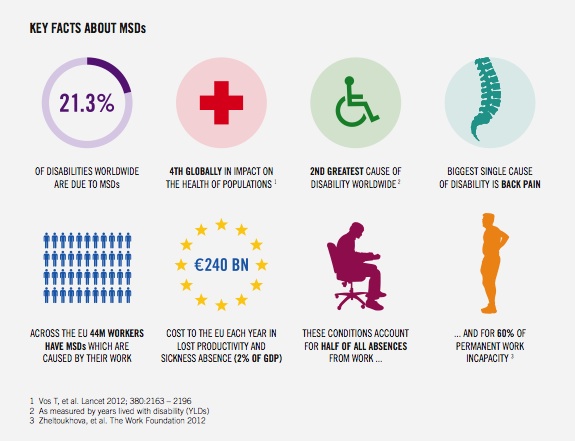The UK and Germany have the worst sickness absence rates in Europe, lagging behind countries such as France, Poland and Romania, according to a report by the Fit for Work Europe Coalition.
The report, which was written by The Work Foundation, found that an extra one million employees could be at work each day across the EU (and more than 600,000 in the UK alone) if early interventions were more widely accessible for those with musculoskeletal disorders (MSDs), such as back pain.
The report uses data from a two-year trial of a successful early intervention clinic for people with MSDs in Madrid, Spain. By assessing and treating 13,000 employees with MSDs after five days of sickness absence, the clinic succeeded in reducing temporary work absence by 39%.
The report explores the impact of these findings on 12 EU member states and predicts how they will affect all 28 EU member states.
The analysis, led by Professor Juan Jovier, shows that, if the Madrid results were repeated across Spain, where 26 million working days are lost to MSDs each year, more than 46,000 Spanish workers would be available for work each day rather than taking sick leave.
In the UK, the report found that more than 35 million days are already lost each year to sickness absence. It also found that, in Germany, the 217 million working days lost each year to MSDs could be reduced by around 480,000 (39%) if the Madrid clinic results were replicated.
It showed that almost 45 million employees across the EU have MSDs, including back pain and strains of the neck, shoulder and arms. This costs up to €240 billion (£202.6 million) annually in lost productivity and sickness absence, representing up to 2% of gross domestic product across the EU.
The report calls on EU member states to coordinate action between government departments, employers and clinicians to tackle this problem and save billions, while transforming the lives of those affected by these conditions.
Stephen Bevan (pictured), founding president of the coalition and director at The Work Foundation, said: “Our analysis now shows that, because access to early healthcare interventions for workers with MSDs are not being prioritised, thousands are taking unnecessarily long periods away from work or even leaving work permanently when tried-and-tested tactics could be helping to speed up their recovery and return to work.
“If these results were repeated across the whole of the EU, we estimate that up to one million workers would be available to work each day. This would be a considerable boost to productivity and significantly reduce sick pay bills at a time when member states are under pressure to make savings and increase economic growth and to tackle unemployment and under-employment.
“Even if the reduction in absence achieved were 25% rather than 39%, we estimate that in excess of 640,000 workers would be available for work each day.”
Dame Carol Black, co-president of Fit for Work, added: “In the UK, 300,000 people make long-term sickness absence claims each year. The results from the Spanish study reveal just how important early intervention is for people with MSDs.
“The study shows that permanent work disability fell by 50%, while temporary work absence fell by 39%, a vast improvement. We know that work is vital for people’s sense of self-worth, and has huge benefits for individuals as well as for the economy.
“With sickness absence currently costing the UK economy £15 billion, the benefits of early intervention must be taken seriously by all stakeholders and woven into government policies.
“Our report is also calling on EU member states to coordinate action between government departments, employers and clinicians to tackle this problem and save billions while transforming the lives of those affected by such devastating conditions.”
